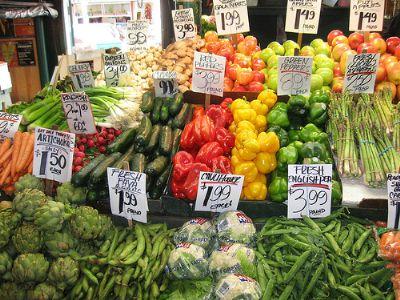
Students in Professor Katherine Beckett’s special topics course, “Food, Law, and Justice,” examined this question during fall quarter. They considered the relationship of law to the contemporary food system and its role in the perpetuation of food-related problems such as obesity and world hunger.
In the first part of the class, students looked at the industrial food system, examining issues such as animal welfare, sustainability and the environmental impact of food production on our ecosystem. Students analyzed the advantages and disadvantages of this system by watching films such as Food Inc., which gives students an overview of the variety of issues associated with food production in the United States.
In the second part of the class, students studied controversies surrounding genetically modified food, and sought to understand how law shapes the food system that we have today.
“We’re really focusing on the role law plays in creating the food system and all of its attendant issues and problems,” said Professor Beckett. “For example, in 1980, the courts decided in Diamond vs. Chakrabarty whether to allow patents on GMO foods. If that Supreme Court case had not occurred, we wouldn’t have GMO foods today.”
In the third part of the class, students examined such justice issues as the causes of global hunger and whether genetically foods are a promising means of addressing food-related problems.
“There’s plenty of food in the world but people can’t pay for the food,” said Beckett. “Law is foundational to food systems, it shapes big things like power structures and political arrangements but also everyday life like what you had for breakfast, how much it cost and the environmental damage it generated.”
LSJ senior, Leslie Berkseth said that the class sounded interesting because she had never considered how the law influences the food that we eat. Since the class is a senior seminar, students were able to have discussions and write in depth papers about topics.
For example, one of the papers that students write is a commodity analysis. Students selected a food product that is available in two forms such as beef that were fed corn as opposed to beef that were fed grass. Then, students traced the role of law in the production of each food and analyzed how each product changed before reaching the consumer.
As part of Berkseth’s research, she went to the University District Farmer’s Market and spoke to various food producers, including a man who raised grass-fed beef. She said that she found it interesting to speak to farmers because we seldom have the chance to interact with the individuals and corporations producing the foods we eat, and thus we have almost no idea of what exactly we are eating or how it is grown and processed.
“The viewpoints we have about food are very romanticized because we are so separated from the realities of food production,” said Berkseth. “The course has led me to question the food I eat. The challenges facing our food system today are in some ways so vast and go beyond our abilities as students to fix but at the same time, we’re left with real life changes we can make that can make a difference.”
This article was composed by Charlotte Anthony.